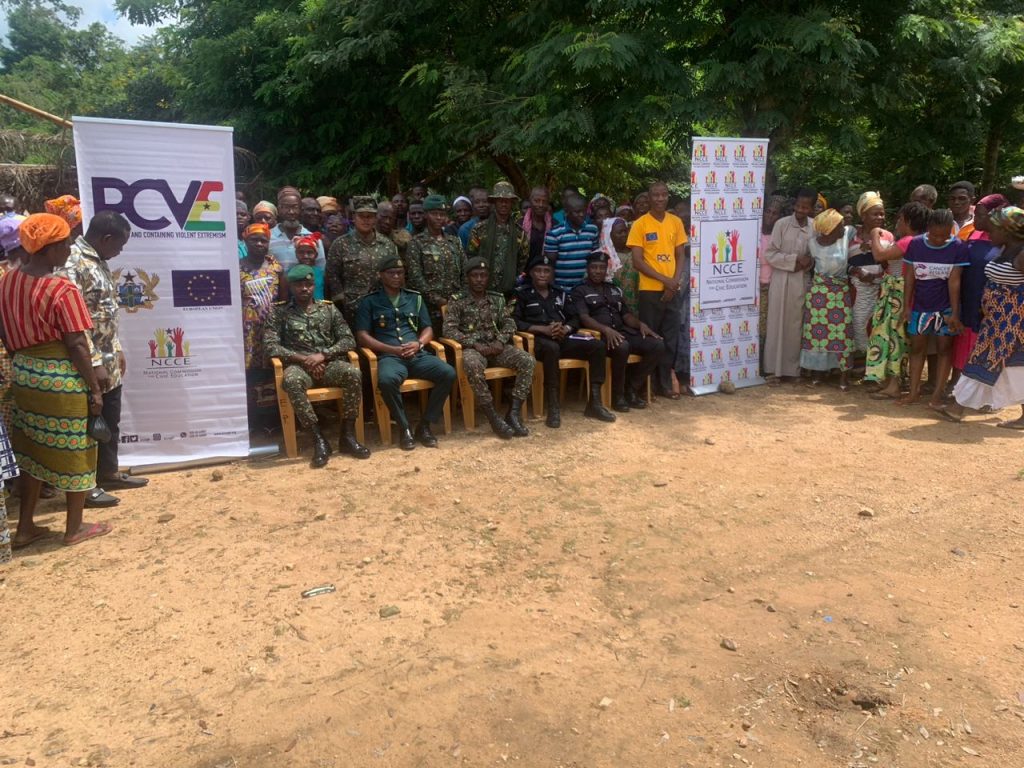By Maxwell Awumah
Agbo Kordzi (O/R), June 28, GNA – Superintendent of Police, Frank Nana Asomaning, the Kadjebi District Police Commander, has appealed to the citizenry to report suspected terrorist activities to the security agencies.
He explained that fighting terrorism was a shared responsibility.
He said terrorists often deploy covet and overt measures to hoodwink communities as visitors and saviours and that should be a pointer.
Supt. Asomaning urged communities, especially in border enclaves, to report unfamiliar faces to agencies of the state.
Supt. Asomaning made the call at a Police/Community Dialogue Session at Agbo Kordzi, a farming community in the Kadjebi District of the Oti Region.
The programme was organised by the Kadjebi District Office of the National Commission for Civic Education (NCCE), with support from the European Union, under the Preventing and Containing Violent Extremism (PCVE) project.
Supt Asomaning said the threat of terrorists attacking communities is real as there had been major attacks in Mali, Burkina Faso, Togo, and La Cote d’Ivoire, with the attacks occurring about two months after another.
The Police Commander said since these attacks are closer to Ghana the possibility of the country experiencing the attack is real as Ghana is not immune to such attacks.
Supt. Asomaning said terrorists targeted schools, churches, mosques, government institutions and security forces as well as carrying out mass abductions, suicide bombings and other acts of violence to achieve their goals.
He advised participants “to run, if not hide, and hide if they could not run” and called 191, 192, 112, 999, and 18555 when they were under attack or spotted suspicious terrorist activity.
The Police Commander mentioned poverty, perceived marginalisation, poor governance, and new technology as some of the drivers of violent extremism.
He said young adults are often targeted by extremist recruiters due to their susceptibility to influence, search for identity and desire for belonging, so parents should be responsible for their children so they do not be recruited.
Supt. Asomaning, who spoke on how to build trust between the Police and Community; the driver of violent extremism, and awareness at the workplace, market and worship centres, said the relationship between the police and the community was critical in fostering a cooperative environment essential for identifying and mitigating extremist threats.
That explains why the community policing policy to build trust and confidence between the police and the public was essential.
“Have confidence in us and give us information. Trust us, we are good,” he added.
Supt. Asomaning said more police officers would be posted to the Kadjebi District to beef up police visibility.
Assistant Superintendent of Immigration (ASI), Hope Nukporfe at the Menuso Border Post, advised parents to watch strange behaviours in their children and act fast.
He said when their children were increasingly becoming secretive, isolating themselves, changing friends, suddenly disrespectful, and easily annoyed, then it could mean they were being radicalised.
He asked the travellers to and from the Republic of Togo not to be worried when they were given a thorough search at the Menuso Border Post since it was for security reasons and for their own good.

ASI Nukporfe also advised the residents to avoid violence before, during and after the December 7 polls as they had no other country apart from Ghana.
Mr Daniel Agbesi Latsu, the Kadjebi District Director of NCCE, in an opening remark, said recognising the threats and taking action to prevent radicalisation towards violent extremism required the collaboration and co-operation of all stakeholders at all levels since traditional policing methods alone were insufficient to counter this complex issue.
He said there should be a mutual relationship between the Police and Community members to mitigate extremist threats, however, there existed a significant trust deficit between communities and the police.
“This is why the engagement today for the police to interact with residents is appropriate.”
GNA